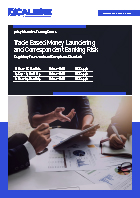| Date | Venue | Fee | |
|---|---|---|---|
| 28 Sep - 02 Oct 2026 | Dubai – UAE | $ 5,950 | Register Now |
| 30 Nov - 04 Dec 2026 | Dubai – UAE | $ 5,950 | Register Now |
About the Course
The challenges of illicit financial activities, particularly Trade Based Money Laundering (TBML), have become more pronounced. TBML involves exploiting international trade mechanisms to obscure the origins of illicit funds, posing significant risks to financial institutions and the broader economy. Understanding and effectively mitigating these risks is crucial for regulatory compliance and safeguarding the integrity of financial systems worldwide.
This 5-day Trade Based Money Laundering and Correspondent Banking Risk training course on TBML and Correspondent Banking Risk is designed to equip delegates with in-depth knowledge and practical insights into identifying, preventing, and managing TBML threats. Delegates will explore the intricate methods and typologies used in TBML schemes, gaining a nuanced understanding of how these activities can be disguised within legitimate trade transactions. Moreover, it is pivotal in correspondent banking relationships facilitating cross-border transactions, highlighting these partnerships' inherent risks and compliance challenges.
Through a series of structured sessions, delegates will examine the regulatory frameworks governing TBML and correspondent banking, learn best practices for due diligence, transaction monitoring, and reporting obligations, and emphasize the importance of leveraging technological advancements to enhance detection capabilities and strengthen overall risk management strategies.
By the end of the training program, delegates will be equipped with actionable insights and practical strategies to bolster their institutions' defenses against TBML. It aims to enhance individual competencies and fosters a collaborative approach among financial professionals to effectively combat financial crime. Ultimately, the goal is to empower delegates with the knowledge and tools necessary to navigate the complex landscape of TBML and correspondent banking risks in today's global financial environment.
Core Objectives
By the end of the training course, delegates will be able to:
- Gain a comprehensive understanding of the definition, scope, and typologies of Trade Based Money Laundering (TBML)
- Explore the roles and responsibilities within correspondent banking relationships while identifying associated risks and compliance challenges in cross-border transactions
- Learn advanced techniques and technologies for detecting and preventing TBML
- Familiarise with global regulatory frameworks and best practices for TBML compliance
- Develop and implement risk-based approaches to mitigate TBML risks effectively
Training Approach
This training course will utilise a combination of interactive lectures and case studies to facilitate a deep understanding and practical application of TBML and correspondent banking risk concepts. Delegates will engage in group discussions and hands-on exercises to reinforce learning and develop actionable strategies for effective risk management.
The Attendees
This training course is designed for professionals involved in financial compliance, risk management, and anti-money laundering efforts within financial institutions.
Likewise, it will be valuable to the professionals but not limited to the following:
- Compliance Officers
- Risk Managers
- Financial Crime Investigators
- AML/CFT Analysts
- Trade Finance Professionals
Daily Discussion
DAY ONE: UNDERSTANDING TRADE BASED MONEY LAUNDERING (TBML)
- Definition and Scope of TBML
- Methods and Techniques Used in TBML
- Regulatory Framework and Compliance Standards
- Red Flags and Indicators of TBML
- TBML Typologies and Variations
- Impact of TBML on Financial Institutions
- Challenges in Detecting and Preventing TBML
DAY TWO: CORRESPONDENT BANKING OVERVIEW
- Introduction to Correspondent Banking Relationships
- Roles and Responsibilities of Correspondent Banks
- Risks Associated with Correspondent Banking
- Regulatory Expectations and Compliance Challenges
- Due Diligence in Correspondent Banking
- Monitoring and Reporting Requirements
- TBML through Correspondent Banking
DAY THREE: TRADE FINANCE INSTRUMENTS AND RISKS
- Overview of Trade Finance Instruments
- Documentary Credits (Letters of Credit) and Risks
- Documentary Collections and TBML Risks
- Trade-Based Red Flags and Anomalies
- Structuring Transactions to Evade Detection
- Financial Institutions' Role in Trade Finance
- Enhancing Due Diligence and Risk Mitigation
DAY FOUR: STRATEGIES FOR EFFECTIVE TBML PREVENTION
- Implementing Risk-Based Approaches in TBML Prevention
- Role of Technology and Automation in TBML Detection
- Enhancing Transaction Monitoring Systems
- Cross-border Challenges in TBML Investigations
- Integrating AI and Machine Learning for TBML Risk Management
- Regulatory Compliance and Reporting Obligations
DAY FIVE: REGULATORY COMPLIANCE AND RISK MITIGATION
- Global Regulatory Landscape for TBML
- Enforcement Actions
- Legal and Regulatory Responses to TBML
- Collaboration between Financial Institutions and Authorities
- Developing Effective TBML Risk Management Programs within the Organisation
Certificate Awarded
Upon successful completion of this training course, participants will be awarded a Certificate of Completion from XCalibre Training Centre, acknowledging their accomplishment. This certificate serves as a testament to their dedication to developing their skills and advancing their expertise in their respective fields.



